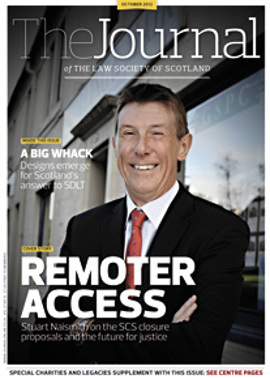President's column
When I entered the presidency, I wondered what might be the big issues, the slippery banana skins, the yawning chasms. There are plenty of challenges for sure: court restructuring, general economic downturn, ABS, even the independence referendum and the legal issues arising from the process and the possible outcomes. But the one I thought was a lower level of problem was legal aid.
Don’t get me wrong. Shaving the income of members of this Society, and reducing access to justice for the very people who need it, are both inimical and require to be fought, but I saw that as more attrition, returning to seasonal campaigning as the next lot of money gets hoisted out of the system. The big arguments seemed to have been dealt with, and our troops both inside the Society’s administration and the practitioners campaigning locally and nationally were now fighting a well organised withdrawal to get the best positions they could with the weapons available to them.
Dynamited
But there is now a big bang again, and one that requires individual attention. As readers will know, the Scottish Government is legislating to allow criminal legal aid to be made subject to payment of financial contributions by accused persons, who apply on a case-by-case basis. Fundamentally this could be argued to be evolution not revolution, as many civil certificates are subject to such contribution on a well understood scale, and criminal work is already means tested to a great extent. The principle is more about where along the scale to set the balance (it is still reducing access to justice, but let’s allow that to pass for the moment).
The problem is that of collection. As we stand just now, the idea is that, as with civil contributions, the Board staff will collect payment for solemn cases and certificates. But the innovation is that solicitors are to be tasked with collection of summary certificate contributions – a much bigger number of cases.
Whatever the motivation behind this idea – and we have to presume it was intended to be a labour and resource-saving exercise for the Board, and to put solicitors in charge of the administrative work when they are already in close contact with the client and do all the paperwork – the potential effects are explosive. And not in a good way.
Lose-lose situation
Legal aid practitioners are already paid a fraction of private rates (of lawyers – and plumbers), and in many areas of work have either not had an increase in years/decades, or have had rates cut, or even provision taken away entirely. At their own cost, they will now have to chase up the client for payment of part of the fee actually due to them by the Board, and if it does not get paid, their only real remedy is to withdraw from acting for a non-co-operating client, for the legal aid certificate to be terminated. And then they get nothing.
Apart from failure/refusal/inability to pay by some of the less well organised and motivated members of Scottish society, who will very likely have financial and debt problems, how long will it be before some clients who have experience of the system try to do deals with practitioners by offering to instruct them as long as the contribution is forgotten about? Notwithstanding any regulatory issues, genuinely hard-pressed practitioners might think that getting the majority of an already low fee is better than getting nothing and losing both a case and a client. If the contribution is a low sum in itself, it may not be worth suing in the small claims court with the attendant hassle, waste of time and relative ineffectiveness of civil litigation and diligence. God forbid that a few desperate solicitors might let it be known that they would take on business and not seek the contribution, as a sales pitch.
In speaking to a number of practitioners in this area of work, I get the distinct impression that this may be a provision too far. Indeed there are constitutional and human rights aspects, and frankly an old-fashioned issue of fairness. Singling out summary applications for this burdensome and uncertain innovation seems to have no merit in it whatsoever, and indeed commentators have told the Government that it is likely to lead to more and more unrepresented accused, which while it might save SLAB a fee each time, will increase the burden on court resources and lead to a decrease in access to justice.
If this is a line in the sand, I know which side my desert boots will stand on.
In this issue
- Players and winners
- Access to client money?
- Tax and residential property
- Trusts and the family business
- Planning: the next level
- Reading for pleasure
- Opinion: Tom Mullen/Alan Paterson
- Council profile
- Book reviews
- President's column
- Deed plan criteria
- Decision time for justice
- "Can do": can you?
- Taxes heading north
- When the agent answers
- Taking care of child cases
- Collective redress
- Making sense of hearsay rules
- Don't forget the register
- Alcohol: the healthy option
- Seeding scheme is a draw
- Scottish Solicitors' Discipline Tribunal
- Human trafficking: is the system responding?
- Power points and positive rights
- A way to apply yourself
- Society presents "ambitious plans"
- Law reform roundup
- Business benefits
- On the right track
- Ask Ash
- Business radar
- Legacies: the untapped potential
- Charity begins at law
- Love them and leave to them
- Those difficult relatives






